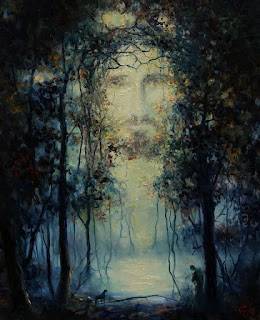 |
| Rembrandt |
John 8:1-12
Jesus returned to the Mount of Olives, but as soon as day dawned, he was already in the Temple court, where the people flocked to him, and he sat down and began to teach them. The teachers of the law and the Pharisees led in a woman caught in adultery. They made her stand in the middle, and said to Jesus, “Teacher, this woman was caught in the act of adultery. In the law, Moses commanded us to stone such women. Now, what do you say?” They said this only as a trap, in order finally to have a reason for accusing him.
But Jesus bent down and started to write something into the earth with his finger. When they kept on pressing him with questions, he stood up and said to them, “Whoever among you is without sin, let him cast the first stone at her.” And again, he bent down and wrote into the earth.
 |
| Dore |
When they heard this, their conscience began to stir within them, and they went out, one after the other, beginning with the eldest. And only Jesus was left and the woman who stood in the middle. Jesus stood up and said to her, “Woman, where are they? Has no one passed judgment on you?”
“No one, sir,” she said.
Then Jesus declared, “Neither do I condemn you. Go now and leave your life of sin.”
And Jesus began to speak to them again: “I am the light of the world; he who follows me will not walk in darkness but have the light in which there is life.”
3rd Passiontide
March 31, 2020
John 8, 1-12
A fruit-bearing tree goes through its stages. When the fruit is green, it may drop. When fruit is ripe, it will drop. When overripe, the fruit drops and spoils. We do not blame the tree for dropping its fruit. We do not pass judgment or punish the tree because of its overripe fruit spoils. The tree is bound to follow the natural course of events.
In a certain sense, our deeds exist in a kind of hidden natural realm, a realm that has its own lawfulness. Our sins, our errors, our failures are a bit like fruit. Some of them come from our greenness, our immaturity. Some of them come from our over-ripeness. It is as useless to pass judgment and dole out punishment as it is to stone a tree that has dropped its fruit. Punishment doesn’t change anything. What is needed is understanding, a kind of wisdom, and a desire to help.
When we understand where someone’s ‘sins’ come from, including our own; when we understand how the state of their inner nature, their weakness or misguided errors, led them to do what they did, then we can begin to let go of the need to accuse. We can let go of our demand for retribution. For just as fallen fruit contains a seed within it, so does our deed. The deed itself will, in time, call forth its own compensation.
All of our deeds, good and bad, contain within them the seed of their required compensation, the seed of their karmic balancing. Like the elders in the gospel story, we are not required to be the enforcers of others’ karma. The universe, as God created it will do that.
Our
 |
| Mariusz Lewandowski |
A truly Christ-inspired attitude toward the sinner (ourselves included) is not to play judge and executioner, but rather to understand. We need to understand that we all are flawed. We need to understand that the universe will provide the opportunity for balancing the deed in the future; to understand that it is far more helpful to work to overcome the causes of failures, errors, weaknesses in myself, for the sake of others. It is essential to strengthen myself and others through Christ so that like the woman in the Gospel, we can walk forward into the future in Christ’s light.
www.thechristiancommunity.org
